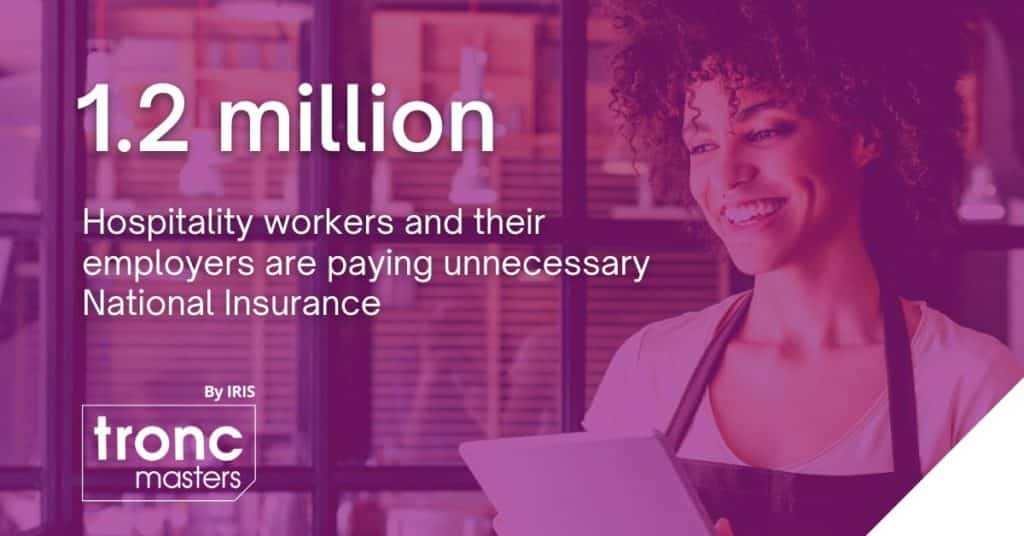
This startling headline has come out of recent research by IRIS Software Group (IRIS), in partnership with Censuswide with 500 hospitality businesses across the UK. The purpose of the study was to establish how hospitality businesses were handling tips and their understanding and use of tronc schemes.
The hospitality industry employed 2,543,000 workers in 2021, and this is on the rise. Many are earning the National Minimum Wage or National Living Wage and rely on tips to top up their income. This is more critical than ever before in today’s economic crisis.
The study highlights 1,169,000 1 employees are paying too much National Insurance on their tips. 46% of hospitality businesses add pooled tips to existing PAYE or payroll without using a tronc, resulting in employees and employers unnecessarily paying NI on these pooled tips.
The nature of tipping has changed
The survey also highlighted the change in how we tip in the UK. Cash is no longer the only form of tipping, with 64% of restaurants, cafes, pubs and bars accepting card tips and more than 50% operating a service charge. These have to be shared with staff through payroll to be compliant with tax law.
This highlights one of the big challenges facing hospitality businesses and how they distribute tips. Troncs have been around for a while, but when tips were mainly cash and could be distributed from the ‘tip jar’ to staff, many hospitality businesses didn’t see the need for a tronc scheme. However, as our recent blog, ‘Could you be an EPOS tax evader without realising it?’ exposed, businesses who ‘solve’ the problem of card and cashless tips by allowing staff to take the tip value from the till are unwittingly committing tax evasion.
Non-compliant Troncmasters
The research further reveals bias or non-compliance in distributing tips is common.
Of those hospitality businesses with a Troncmaster, who controls how the tips are allocated, 38% are managers, and 30% are directors or business owners. This is non-compliant as the Troncmaster cannot be biased or have any hiring responsibilities and exposes the business to potential HMRC penalties.
This non-compliant situation rises to 75% in restaurants and 30% in cafes. The penalty for non- compliance could be equivalent to the backdated National Insurance contributions for up to six tax years, a huge hit to any business.
New laws on the horizon
We have discussed the likely new laws regarding the fair distribution of tips in our blog ‘Government confirms tips legislation will be brought before Parliament’. This law will make it illegal for employers to withhold tips from workers. This is likely to come into effect in late 2023, but many businesses are looking to make changes now, so they comply, and a tronc scheme is the best vehicle to do this.
These stats very much back up what we are seeing and hearing from the hospitality businesses who contact us for advice and support and is summed up perfectly by Stuart Stephen, Vice President of Managed Services at IRIS,
“Tips and service charges provide a significant and welcome boost to hospitality employees’ take-home wage. However, although the government has spotlighted unfair practices, more must be done to ensure tips are pooled fairly and comply with the law.
“Payroll is a highly sensitive and ‘mission-critical’ function. A properly run tronc scheme is not only compliant and accurate, but also ensures employees continue to feel motivated as more of their hard-earned tips, gratuities, or service charges go into their pocket.”
If you are worried your hospitality business and employees are paying too much National Insurance, you could benefit from independent troncmaster services from Troncmasters. From consultancy advice on tronc formats to fully managed tronc services, in which we handle everything from set up to the processing and distribution of tips, we ensure you never pay too much National Insurance on tips.
Please get in touch with us if you would like to discuss how your business and employees could benefit from a compliant and ethical tronc scheme.
Footnote
1 According to Table 1 in the Government Impact Assessment on Preventing employer deductions from worker tips, there were 2,543,000 million employees working across all tipping industries in 2021. 46% of this figure (those that do not use a tronc scheme) is 1,170,000.
In September 2022, the research was carried out by IRIS Software in partnership with Censuswide with 500 hospitality business owners and HR/finance staff who are decision-makers in tip distribution.
